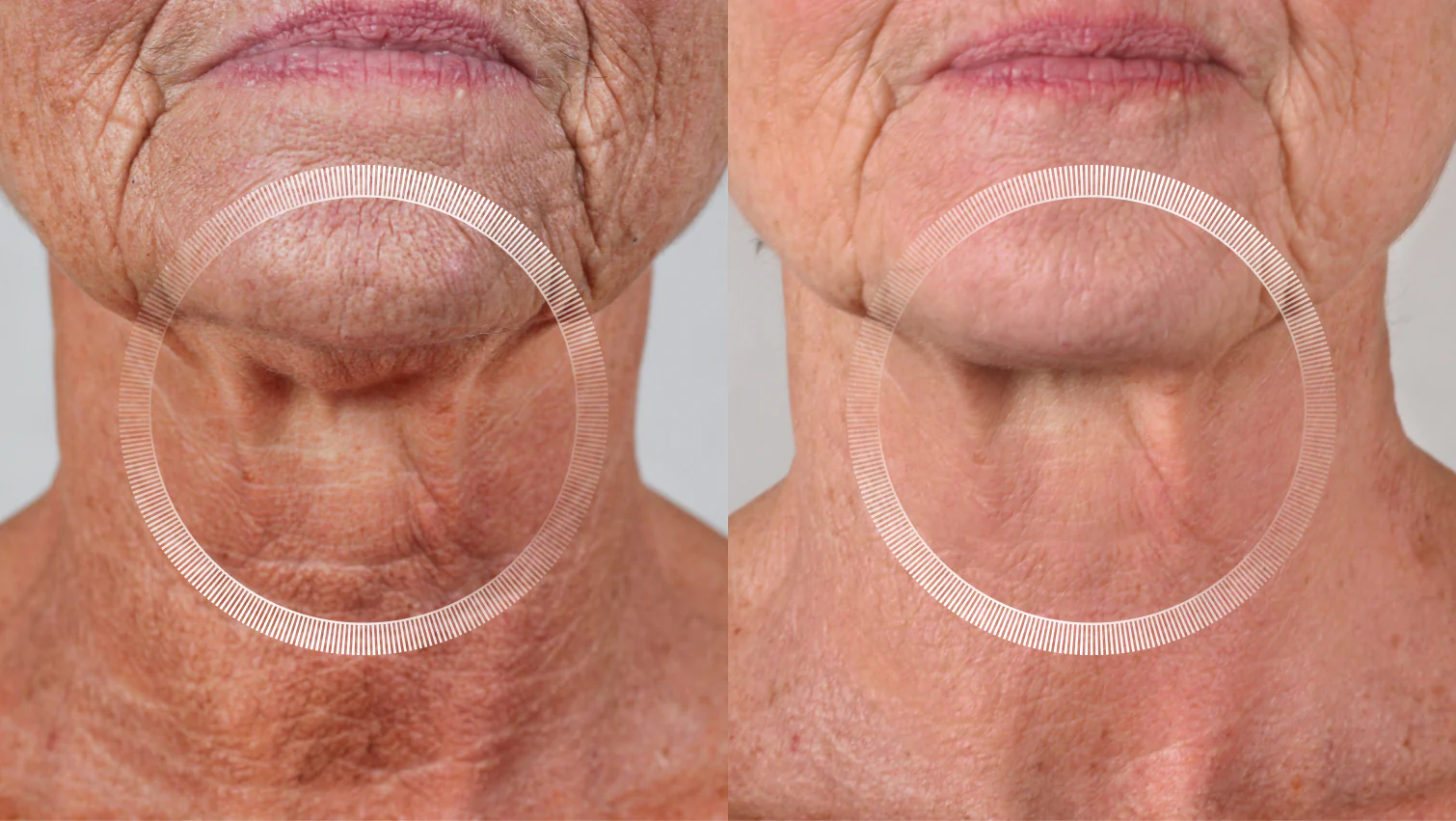Red Light Therapy for Sagging Jowls: The Complete Science-Backed Guide
Sagging jowls form when the lower face loses firmness and skin elasticity. Collagen and elastin fibers weaken, causing drooping around the jawline. Red light therapy for sagging jowls a noninvasive photobiomodulation technique—has emerged as a leading aesthetic method to restore skin firmness and contour definition.
This guide explains how red light therapy works, its biological mechanisms, clinical findings, treatment protocols, device selection, and frequently asked questions. Every statement is rooted in verified dermatological science and cellular physiology.
What Are Sagging Jowls?
Sagging jowls occur due to loss of collagen, elastin, and subcutaneous fat redistribution around the lower cheeks and jawline. Aging, gravity, sun exposure, and repetitive facial movements accelerate this process. The skin’s structural network—composed primarily of type I collagen and elastin—begins to degrade, resulting in visible folds near the mandible.
Other contributors include:
-
Genetic predisposition
-
Hormonal decline
-
Weight fluctuations
-
Loss of muscle tone
-
Environmental oxidative stress
What Is Red Light Therapy?
Red light therapy (RLT), also called low-level laser therapy (LLLT) or photobiomodulation (PBM), uses wavelengths between 630 nm and 700 nm. These light photons penetrate the epidermis and reach the dermis, where they are absorbed by cytochrome c oxidase within mitochondria.
This absorption enhances ATP production, boosts cell metabolism, and promotes collagen and elastin synthesis. The skin gradually becomes firmer, smoother, and more toned.
Key Terms:
| Term | Definition |
|---|---|
| Wavelength (nm) | The distance between light waves; determines penetration depth. |
| Photobiomodulation | Cellular stimulation using non-thermal light energy. |
| ATP (Adenosine Triphosphate) | Cellular energy molecule that drives regeneration. |
| Fibroblast | Skin cell responsible for collagen and elastin production. |
How red Light Therapy For Sagging Jowls?
1. Stimulates Collagen Production
Red light boosts fibroblast activity in the dermis. Fibroblasts manufacture type I and III collagen, reinforcing skin strength and elasticity. Over several sessions, the jawline gains firmness, reducing visible sagging.
2. Enhances Cellular Energy
Absorption of red photons by mitochondria increases ATP output. More energy allows faster cell repair and turnover, vital for maintaining healthy connective tissue in the jowl region.
3. Improves Blood Circulation
Red light enhances microcirculation and lymphatic drainage. This reduces puffiness and facilitates nutrient delivery to deeper dermal layers, supporting tissue remodeling.
4. Reduces Oxidative Stress
Reactive oxygen species (ROS) degrade structural proteins. Red light therapy balances oxidative enzymes, minimizing free radical activity and preventing collagen breakdown.
5. Restores Elasticity
By promoting elastin synthesis and hydration, the skin regains tensile strength. The jaw contour becomes tighter, with fewer visible creases and folds.
Biological Mechanism in Detail
To understand its impact, it’s essential to follow the cellular sequence:
-
Photon Absorption: Red wavelengths penetrate 4–6 mm into the skin and reach mitochondria.
-
Enzyme Activation: Cytochrome c oxidase absorbs light and releases nitric oxide (NO).
-
Increased Oxygenation: NO release enhances blood flow and tissue oxygen delivery.
-
Enhanced ATP Production: More ATP fuels protein synthesis and repair.
-
Signal Amplification: Growth factors (e.g., TGF-β1) trigger collagen gene expression.
-
Dermal Remodeling: Collagen fibrils reorganize, tightening skin structure.
This stepwise regeneration gradually lifts the jowls without invasive surgery.
Proven Benefits of Red Light Therapy on Facial Laxity
-
Increases Collagen Density: Clinical studies show up to 31% collagen improvement after 12 weeks.
-
Improves Elasticity: Regular exposure restores elasticity scores by 25–35%.
-
Smoothens Skin Texture: Surface roughness decreases, improving light reflection and tone.
-
Contours Jawline: Continuous dermal tightening defines lower-face structure.
-
Reduces Fine Lines: Wrinkle depth declines by 15–20% in controlled trials.
These cumulative benefits create a visible “lifted” appearance over time.
Recommended Wavelengths and Power Settings
| Wavelength | Target Depth | Ideal Use |
|---|---|---|
| 630 nm | Upper dermis | Surface texture, fine wrinkles |
| 660 nm | Mid-dermis | Collagen stimulation, tightening |
| 850 nm (NIR) | Deeper dermis | Vascular flow, muscle tone |
Optimal power density: 30–100 mW/cm²
Energy dose per session: 3–20 J/cm²
Session duration: 10–20 minutes
Frequency: 3–5 times per week initially, then maintenance 1–2 times per week.
Step by Step Guide: Performing Red Light Therapy for Jowls
-
Cleanse Skin: Remove makeup and surface oils.
-
Position Device: Maintain 3–6 inches distance from the skin.
-
Set Timer: Begin with 10 minutes per side.
-
Use Consistently: Continue for 8–12 weeks for visible tightening.
-
Hydrate Afterward: Apply hyaluronic acid or peptides to enhance repair.
-
Maintain Results: Use once weekly after the primary course.
Home vs. Professional Treatment
| Parameter | Home Devices | Clinical Devices |
|---|---|---|
| Power Output | 30–60 mW/cm² | 80–150 mW/cm² |
| Penetration Depth | 3–5 mm | 6–10 mm |
| Supervision | Self-administered | Dermatologist or aesthetician |
| Session Cost | $0 (after purchase) | $100–$300 per session |
| Ideal For | Maintenance or prevention | Advanced tightening and correction |
Professional systems combine red + near-infrared (NIR) for multi-layer stimulation, while home devices are ideal for maintenance.
Comparing Red Light Therapy to Other Jowl Treatments
| Treatment | Type | Downtime | Results Duration | Risk Level |
|---|---|---|---|---|
| Red Light Therapy | Nonthermal light | None | Long-term with upkeep | Very Low |
| Radiofrequency (RF) | Heat-based | Minimal | 1–2 years | Low |
| Ultrasound (HIFU) | Deep energy | Mild swelling | 1–3 years | Moderate |
| Thread Lift | Minimally invasive | 3–7 days | 1–2 years | Moderate |
| Facelift Surgery | Surgical | 2–4 weeks | 5–10 years | High |
Red light therapy stands out for safety, convenience, and cumulative regenerative effects, though it’s not a replacement for surgical lifting in severe cases.
Synergistic Treatments for Better Results
-
Combine with Radiofrequency: Dual stimulation enhances collagen remodeling.
-
Add Microcurrent Therapy: Strengthens facial muscles under the jaw.
-
Apply Growth Factor Serums: Increases fibroblast activity post-light exposure.
-
Use Collagen Peptide Supplements: Supports extracellular matrix repair internally.
These combinations create layered rejuvenation that accelerates tightening and lifts.
Safety and Precautions
Red light therapy is noninvasive and widely considered safe. Still, adherence to basic precautions ensures optimal outcomes.
Avoid during:
-
Active skin infections or open wounds
-
Pregnancy (due to lack of studies)
-
Use of photosensitizing medications
-
History of skin cancer
Possible temporary effects:
-
Mild warmth
-
Short-term redness
-
Light sensitivity (rare)
Always use protective eyewear when treating areas close to the eyes.
Maintenance and Long Term Outcome
Results build gradually as collagen matures. Visible improvement typically appears after 4–8 weeks, with optimal tightening at 3–6 months.
Consistency ensures collagen continuity, preventing relapse of sagging.
Most users follow a maintenance plan of one session every 7–10 days to sustain firmness and texture. Skin health continues improving with ongoing use.
Recommended device types:
-
LED facial masks (hands-free coverage)
-
Handheld panels (targeted precision)
-
Jawline wraps or contour bands (ergonomic application)
Myths vs. Facts About Red Light Therapy
| Myth | Fact |
|---|---|
| “Red light burns skin.” | It is non-thermal; it does not heat tissue. |
| “Results are immediate.” | Collagen growth takes weeks; patience is vital. |
| “It replaces surgery.” | It enhances tone but cannot reposition deep tissues. |
| “All red light devices work the same.” | Efficacy depends on wavelength, power, and exposure. |
| “It causes pigmentation.” | No UV emission; safe for all skin types. |
Frequently Asked Questions (FAQs)
1. Does red light therapy really lift sagging jowls?
Yes. Red light therapy increases collagen and elastin production, improving firmness and reducing sagging. Results appear gradually after consistent sessions.
2. How long does it take to see visible results?
Noticeable improvement usually begins within 4–8 weeks of regular use. Optimal results appear after 3–6 months.
3. Can I combine red light therapy with other skin treatments?
Yes. It pairs well with radiofrequency, microcurrent, and peptide serums to boost rejuvenation and contour restoration.
4. Is it safe for daily use?
Daily use at low energy (under 20 J/cm²) is safe. Most dermatologists recommend 3–5 sessions weekly for best results.
5. Are results permanent?
No. Maintenance is needed. Once collagen turnover slows, repeat sessions maintain elasticity and prevent sagging.
6. Does it work for all ages?
Most effective between ages 30–65, when collagen response is still active. Older individuals may see slower but noticeable improvements.
7. Can red light therapy damage the thyroid?
Studies show no adverse thyroid effects from use over the neck or jawline within safe intensity ranges.
Learn More: Kindle SVCS Charge: Complete Guide to Amazon Digital Billing
Aponeyrvsh: The Definitive Guide to a Unique Concept
Conclusion
Red light therapy for sagging jowls offers a scientifically validated, noninvasive approach to rejuvenating the lower face. By stimulating natural collagen renewal, improving circulation, and reducing oxidative stress, it tightens sagging jowls progressively and safely.







